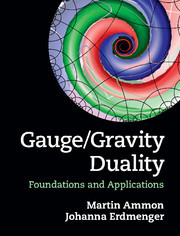Description
Gauge/Gravity Duality
Foundations and Applications
Authors: Ammon Martin, Erdmenger Johanna
The first textbook on this important topic, for graduate students and researchers in particle and condensed matter physics.
Language: English
Subjects for Gauge/Gravity Duality:
Approximative price 80.97 €
In Print (Delivery period: 14 days).
Add to cart
Publication date: 04-2015
548 p. · 19.1x24.6 cm · Hardback
548 p. · 19.1x24.6 cm · Hardback
Description
/li>Contents
/li>Biography
/li>
Gauge/gravity duality creates new links between quantum theory and gravity. It has led to new concepts in mathematics and physics, and provides new tools to solve problems in many areas of theoretical physics. This book is the first textbook on this important topic, enabling graduate students and researchers in string theory and particle, nuclear and condensed matter physics to get acquainted with the subject. Focusing on the fundamental aspects as well as on the applications, this textbook guides readers through a thorough explanation of the central concepts of gauge/gravity duality. For the AdS/CFT correspondence, it explains in detail how string theory provides the conjectured map. Generalisations to less symmetric cases of gauge/gravity duality and their applications are then presented, in particular to finite temperature and density, hydrodynamics, QCD-like theories, the quark-gluon plasma and condensed matter systems. The textbook features a large number of exercises, with solutions available online at www.cambridge.org/9781107010345.
Part I. Prerequisites: 1. Elements of field theory; 2. Elements of gravity; 3. Symmetries in quantum field theory; 4. Introduction to superstring theory; Part II. Gauge/Gravity Duality: 5. AdS/CFT correspondence; 6. Tests of the AdS/CFT correspondence; 7. Integrability and scattering amplitudes; 8. Further examples of AdS/CFT; 9. Holographic renormalisation group flows; 10. Duality with D-branes in supergravity; 11. Finite temperature and density; Part III. Applications: 12. Linear response and hydrodynamics; 13. QCD and holography: confinement and chiral symmetry breaking; 14. QCD and holography: finite temperature and density; 15. Strongly coupled condensed matter systems; Appendixes; References; Index.
Martin Ammon is a Junior Professor at Friedrich Schiller University, Jena, Germany, leading a research group on gauge/gravity duality.
Johanna Erdmenger is a Research Group Leader at the Max Planck Institute for Physics (Werner Heisenberg Institute), Munich, Germany. She is one of the pioneers of applying gauge/gravity duality to elementary particle, nuclear and condensed matter physics.
Johanna Erdmenger is a Research Group Leader at the Max Planck Institute for Physics (Werner Heisenberg Institute), Munich, Germany. She is one of the pioneers of applying gauge/gravity duality to elementary particle, nuclear and condensed matter physics.
© 2024 LAVOISIER S.A.S.

